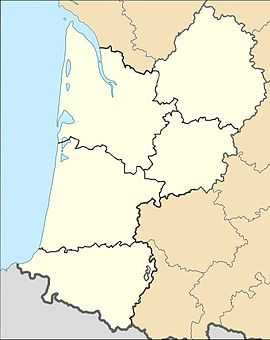Saint-Astier, Dordogne
| Saint-Astier | ||
|---|---|---|
|
| ||
| ||
 Saint-Astier | ||
|
Location within Aquitaine region  Saint-Astier | ||
| Coordinates: 45°08′47″N 0°31′45″E / 45.1464°N 0.5292°ECoordinates: 45°08′47″N 0°31′45″E / 45.1464°N 0.5292°E | ||
| Country | France | |
| Region | Aquitaine | |
| Department | Dordogne | |
| Arrondissement | Périgueux | |
| Canton | Saint-Astier | |
| Intercommunality | Astérienne Isle et Vern | |
| Government | ||
| • Mayor (2008–2014) | Jacques Monmarson | |
| Area1 | 34.25 km2 (13.22 sq mi) | |
| Population (2008)2 | 5,383 | |
| • Density | 160/km2 (410/sq mi) | |
| INSEE/Postal code | 24372 / 24110 | |
| Elevation |
58–222 m (190–728 ft) (avg. 108 m or 354 ft) | |
|
1 French Land Register data, which excludes lakes, ponds, glaciers > 1 km² (0.386 sq mi or 247 acres) and river estuaries. 2 Population without double counting: residents of multiple communes (e.g., students and military personnel) only counted once. | ||
Saint-Astier is a commune in the Dordogne department in Aquitaine in southwestern France. It takes its name from a sixth-century saint.
Population
| Historical population | ||
|---|---|---|
| Year | Pop. | ±% |
| 1793 | 2,216 | — |
| 1800 | 1,985 | −10.4% |
| 1806 | 2,263 | +14.0% |
| 1821 | 2,518 | +11.3% |
| 1831 | 2,546 | +1.1% |
| 1836 | 2,613 | +2.6% |
| 1841 | 2,561 | −2.0% |
| 1846 | 2,769 | +8.1% |
| 1851 | 2,826 | +2.1% |
| 1856 | 2,931 | +3.7% |
| 1861 | 2,879 | −1.8% |
| 1866 | 2,913 | +1.2% |
| 1872 | 2,891 | −0.8% |
| 1876 | 2,961 | +2.4% |
| 1881 | 3,280 | +10.8% |
| 1886 | 3,581 | +9.2% |
| 1891 | 3,201 | −10.6% |
| 1896 | 3,073 | −4.0% |
| 1901 | 2,942 | −4.3% |
| 1906 | 3,042 | +3.4% |
| 1911 | 3,204 | +5.3% |
| 1921 | 2,953 | −7.8% |
| 1926 | 3,053 | +3.4% |
| 1931 | 3,067 | +0.5% |
| 1936 | 3,073 | +0.2% |
| 1946 | 3,415 | +11.1% |
| 1954 | 3,933 | +15.2% |
| 1962 | 4,256 | +8.2% |
| 1968 | 4,052 | −4.8% |
| 1975 | 4,093 | +1.0% |
| 1982 | 4,416 | +7.9% |
| 1990 | 4,780 | +8.2% |
| 1999 | 5,091 | +6.5% |
| 2008 | 5,383 | +5.7% |
See also
References
| Wikimedia Commons has media related to Saint-Astier (Dordogne). |
.svg.png)